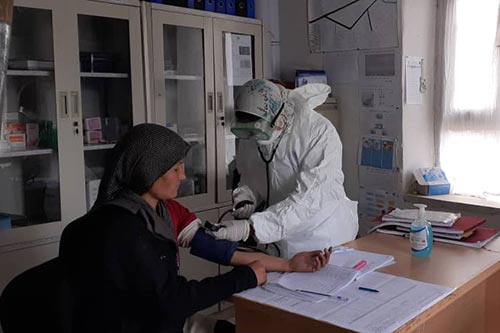News
Midwives on the front lines working to reverse Afghanistan’s high maternal death rate
- 21 October 2020
News
SHAHRISTAN, Afghanistan – “It was midnight on 6 August when there was a loud knocking at my front door. My husband answered. Standing in the dark was a person asking for my help – a baby was being born,” Shirin described to UNFPA.
It was the start of the greatest challenge she had ever faced as a midwife.
Shirin, 31, manages a family health house in Usho Golaka Village, in Daikundi Province. Family health houses are community-based facilities that provide a host of basic reproductive health services in remote communities, including family planning, antenatal care, safe delivery services, newborn care and immunizations.
She knew the man. He was a relative of Fatima, one of her patients. “Tonight her situation was critical,” Shirin said.
Fatima, already a mother of six children, was in labour with her seventh. Shirin was immediately alarmed – an earlier examination had shown that the delivery would be dangerous.
“Fatima’s baby was found to be in the wrong position and the delivery was to be a breach birth,” Shirin explained. “I'd provided information and counselling on her condition, but advised her to refer the case to the provincial hospital in Nili, the center of Daikundi, for further management of her delivery.”
But Fatima’s family couldn’t afford to seek care so far from home. “We’re a poor family and the economy and unavailability of transport was a big problem for us,” Fatima said. “We would have had to pay 13,000 afghanis [$170] for transport to reach the provincial hospital in Nili. This was not possible.”
Afghanistan has one of the highest maternal mortality rates in the world, according to United Nations data. Some 638 women die per 100,000 live births. Poverty, lack of access to health services and gender inequality all contribute to these tragically high numbers; fewer than 60 per cent of births are overseen by skilled health professionals.
To address these concerns, UNFPA supports Afghanistan’s community midwifery education programme, a training programme funded by the Canadian Government, which equips midwives to provide essential basic maternal health services and other midwifery care. These midwives then operate from UNFPA-established family health houses, which provide the only medical services available in Afghanistan’s remotest and most difficult-to-reach areas.
Shirin graduated from the community midwifery education programme in 2015. She has since worked in the family health house in Usho Gholaka, where she has served hundreds of women.

Her husband is supportive of her work. That night, he took her by motorbike to the village where Fatima and her family live.
“The intent was to save a mother and her baby,” her husband said. “I’ve pledged to support my wife in this work, even if it’s midnight.”
Shirin found Fatima suffering in terrible pain, shouting for help. She tried to find a way for the family to urgently transport Fatima to the provincial hospital, but the family felt it was impossible.
Although Shirin is an experienced midwife, she is not equipped to manage serious complications like breach delivery. But in that situation, she was forced to improvise.
“I called an expert gynaecologist who was working in the provincial hospital and asked for instructions. This was the only solution I could come up with that might save their lives. I was instructed to use different manoeuvres to shift the position of the baby in the womb. I followed the gynaecologist’s guidance carefully.”
It was a tense labour – but in the end, her efforts paid off.
“Finally, the uterine contraction began and a baby boy was born after one hour and 45 minutes of labour. He was safe and healthy,” Shirin recalled.
Fatima’s family was greatly relieved.
“When I heard that Fatima and her baby were alive, I can’t tell you how happy I was,” Fatima’s mother-in-law told UNFPA. “I am so grateful to Shirin for being there and helping women in need.”
Fatima later brought her newborn to the family health house for postnatal services. “I’m grateful to Shirin,” she said. “She saved not only my life but also the life of my child.”
And Shirin, too, is grateful. Though the experience was harrowing, she feels she has grown as a midwife.
“I was very proud of what I did,” she said.